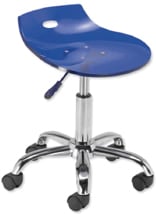Management Essentials
Physician, Keep Thyself Well
Even doctors need to be reminded to take care of themselves.
By Farrell “Toby” Tyson, MD, FACS
Here I sit on a cramped airplane seat awaiting takeoff. My back is already starting to hurt and I have a full day of surgeries tomorrow. The flight attendant starts to go through her preflight instructions when something she says grabs my attention. “In the case of loss of cabin pressure, please place the oxygen mask over your face before helping others.” It is such a basic idea, that one needs to take care of oneself before helping others, but it’s necessary to broadcast that message on every flight.
Pains in the Neck
As doctors, we are entrusted with the care of others, but often we neglect ourselves. In my hometown, four ophthalmologists have had neck surgery, including my father. While we can’t say all those surgeries are directly related to the profession, their high incidence and the poor ergonomics of the slit lamp or operating microscope raise cause for concern. Carpal tunnel syndrome is commonly associated with repetitive work injuries, but in ophthalmology, injuries are more likely to be neck- and back-related.
Appropriate positioning of the patient and new technology can reduce some posture-related stressors. Many surgeons have learned to roll the patient to allow for more natural positioning in the operating room. I found an operating stool that works well for me. The seat tilts forward, placing my back in a natural alignment. All operating microscopes can be fitted with adjustable oculars and several slit lamp manufactures have followed suit. My friend, Rob Weinstock, MD has utilized Truevision’s 3-D virtual imaging in his operating room to liberate him from having to look through the microscope. All these technologies help optimize a still physically repetitive and stressful job.

Getting into a Routine
Two of my favorite mentors have helped advance ophthalmology by innovating surgical techniques and equipment design, but they have also shown that ophthalmology can truly be a rewarding, lifelong career. Jim Gills, MD, is a noted surgeon, but anyone who has met him knows that he espouses the value of physical fitness. It is not uncommon for him to find time to work out using an elliptical machine during breaks in meetings or to engage in mini-workouts throughout the day. Physical fitness does not only keep the body able to fight the daily stressors, but also keeps the mind agile.
Manus Kraff, MD, also believes in daily exercise. He will let you know it is not just the exercise that keeps him healthy, but also what fuels his body. Our busy schedules between work and family life leaves little time for exercise and even less for proper nutrition.
This raises the question: How do you take care of yourself when all of life is pulling you in a thousand directions? Start by scheduling some self-care time. Different things work for different people. My colleague, Jim Loden, MD, has found that having a set schedule of personal core body training has helped lighten his grueling surgical case load. Another friend, Darrell White, MD, has embraced the cross-fit lifestyle, which involves not only intense daily workouts, but also nutritional balance. By setting a schedule, or participating in a program, the exercise and nutrition stop being a chore and turn into a lifestyle.
Keep Staff in Mind
A doctor’s staff can also benefit from these lessons in self-care. Doctors need a well-rested and energized team. This means not encouraging overtime. Our valued, salaried staff need their time off, too. Encourage them to take time for rest and relaxation. Vacation time should be on a use-it-or-lose-it basis because that incentivizes employees to take that time to recharge. Rested minds are sharp and productive. Over-worked employees can be a detriment to the practice.
Lower reimbursements and increased regulations are delaying retirement for some, while others just wish to keep enjoying this wonderful profession as long as possible. Make that enjoyment last by heeding the flight attendant’s advice: Turn off your electronic devices once in a while and remember to take care of yourself before taking care of others. And enjoy the flight. OM

|
Farrell C. Tyson, MD, FACS, is a refractive cataract/glaucoma eye surgeon at the Cape Coral Eye Center in Florida. He may be reached at tysonfc@hotmail.com. |








